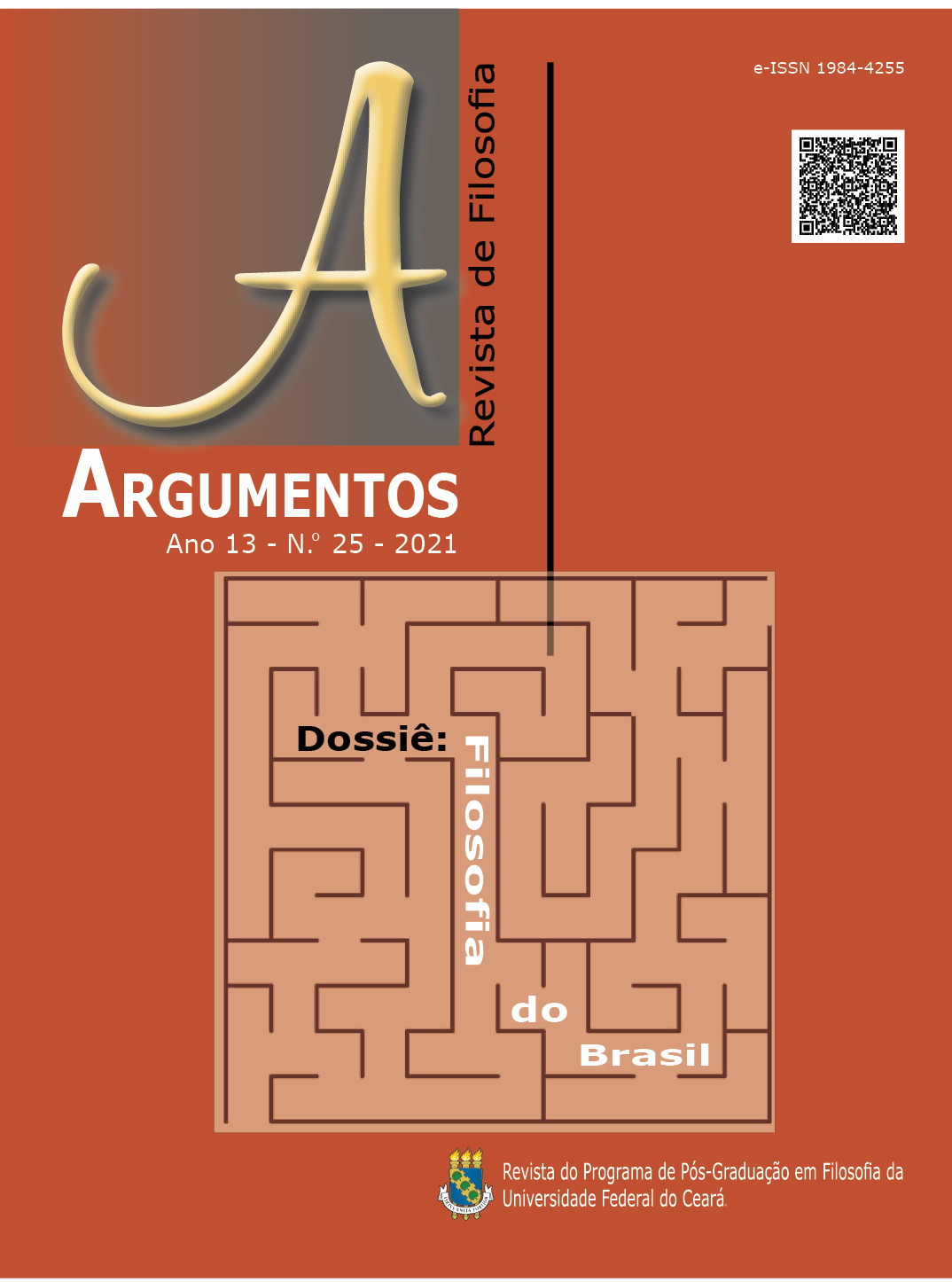Tobias Barreto and the Kantian issues
DOI:
https://doi.org/10.36517/Argumentos.25.17Keywords:
Tobias Barreto. Positivism. Kantism. Criticism.Abstract
Little mentioned and studied in the curricula of the academic environments of Brazilian universities, the Sergipe philosopher, Tobias Barreto, was an important representative of the Northeast with regard to the Brazilian philosophical production of the 19th century. The following article aims to expose some of Tobias Barreto’s ideas, highlighting the importance of working with Brazilian philosophers in a context in which the study of foreign Western philosophers predominates. Thus, this work has a double purpose: to “resuscitate” some ideas this author sought with the tradition that preceded him, especially his departure from the positivism of Auguste Comte and his approach to German philosophy, more specifically, with the reading of Immanuel Kant. of the thought of Tobias Barreto and, at the same time, to show the reading and dialogue that
References
BARRETO, T. Estudos de Filosofia. São Paulo: Grijalbo, 1977.
BARRETO, T. Dias e Noites. Rio de Janeiro: Imprensa Industrial, 1881.
BEVILAQUA, C. Esboços e fragmentos, Rio de Janeiro: Laemmert, 1899.
BEVILAQUA, C. História da Faculdade de Direito do Recife. Vol. II. Rio de Janeiro: Livraria Francisco Alves, 1927.
BRAZ TEIXEIRA, A. A filosofia jurídica do século XIX. Lisboa: Humus, 2011.
CARVALHO, J. A Filosofia Culturalista de Tobias Barreto, a retomada do kantismo. Annales, v. 2, n. 3, 2017.
CARVALHO, J. A filosofia culturalista do direito de Tobias Barreto. In: Atas do X Colóquio Tobias Barreto. Lisboa: MIL. 2016.
CARVALHO, J. Antologia do Culturalismo Brasileiro, um século de filosofia. Londrina: EDUEL, 1998.
CESAR, C. A metafísica de Tobias Barreto. In: Atas do I Colóquio Tobias Barreto. Lisboa: Fundação Calouste Gulbenkian, 1991.
CHACON, V. A sociologia e o germanismo segundo Tobias Barreto e Silvio Romero. Revista Doxa, v. 5, n. 8, 1959.
GUIMARÃES, A. Tobias Barreto e o cientificismo de sua época. In: Atas do I Colóquio Tobias Barreto. Lisboa: Fundação Calouste Gulbenkian, 1991.
HAECKEL, E. História Natural da Criação. Trad. F. Cardoso. Versão para ebook. Livraria Chardon: Porto,1908.
KANT, I. Crítica da razão pura. (ed. A e B). Trad. M. dos Santos e A. Morujão. 7. ed. Lisboa: Fundação Calouste Gulbenkian, 2010.
MOISES, M. A criação literária. São Paulo: Cultrix, 2006.
MOTA, M. A Geração de 1870 e a invenção simbólica do Brasil. Anpuh. Natal. 2013.
PAIM, A. A evolução de Tobias Barreto e seu significado para a filosofia brasileira. In: Atas do I Colóquio Tobias Barreto. Lisboa: Fundação Calouste Gulbenkian, 1991, p. 21-32.
PAIM, A. A problemática do culturalismo. Porto Alegre: Edipucrs, 1995.
PAIM, A. História das ideias filosóficas no Brasil. Londrina: EDUEL, 1997.
PESSOA, L. Aspectos do Pensamento Alemão na Obra de Tobias Barreto. São Paulo: USP, 1985.
ROMERO, S. A Filosofia no Brasil. Porto Alegre: Typ. de Deutsche Zeitung. 1878.
ROMERO, S. A literatura brasileira e a crítica moderna. Ensaio de generalização. Rio de Janeiro: Imprensa Industrial de João Ferreira Dias, 1880.
ROMERO, S. O Brasil na primeira década do século XX. Lisboa: Tip. de “A Editora”, 1911.
Downloads
Published
Issue
Section
License
Argumentos magazine is licensed under an International Creative Commons Attribution License.
The Magazine uses CC BY inclusion
1) The authors retain the copyright granted to the magazine or the right to initial publication, with the work regularly licensed under the Creative Commons Attribution, which allows the sharing of the work with acknowledgment of authorship and initial publication in this magazine.
2) The authors are authorized to contract additional applicable contracts, for non-exclusive distribution of the version of the work published in this journal (for example, publication in the institutional repository or as a chapter of the book), recognition of authorship and initial publication in this journal.
3) Authors are authorized and encourage to publish and distribute their work online (for example, in institutional repositories or on their personal pages) at any time before or during the editorial process, as they can generate productive changes, as well as increase the impact and reference of published work.




.jpg)










._._3.png)
1.jpg)
._._._.png)
